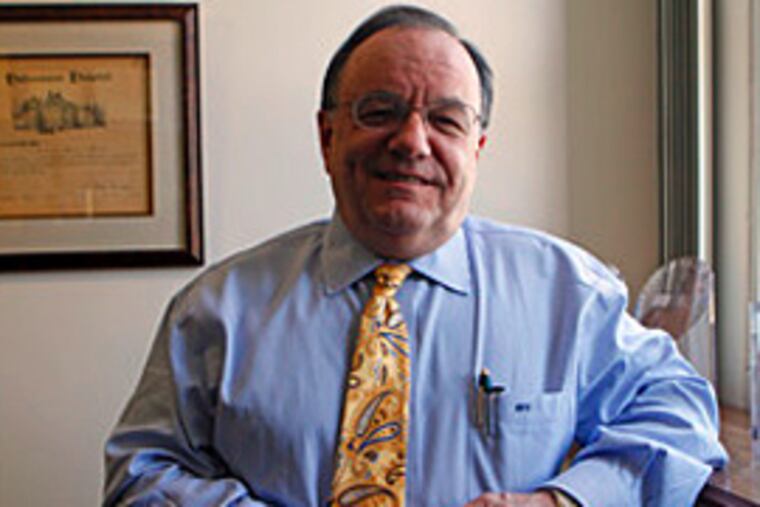Two Tenet hospitals at odds with Blue Cross
Tenet Healthcare Corp.'s two hospitals in the region - Hahnemann University Hospital and St. Christopher's Hospital for Children - are playing a corporate game of chicken with Independence Blue Cross as the expiration date of their contract approaches.

Tenet Healthcare Corp.'s two hospitals in the region - Hahnemann University Hospital and St. Christopher's Hospital for Children - are playing a corporate game of chicken with Independence Blue Cross as the expiration date of their contract approaches.
Talks have broken down, and both sides have notified Blue Cross subscribers that they may not be covered for treatment by the Tenet hospitals or some of their doctors after April 30.
It is an uneven battle, experts said, and it reveals much about the balance of power between the region's hospitals and its dominant private health insurer. Patients and even politicians are getting caught in the cross fire.
Hahnemann and St. Christopher's say Blue Cross wants to pay them significantly less than it pays comparable hospitals. In a joint letter, the two for-profit hospitals called on patients for help, asking them to encourage Blue Cross to accept the Tenet proposal. (Blue Cross says it is getting 25 to 30 calls a day about Tenet.) The issue came up last week in Philadelphia's City Council, and yesterday the hospitals gave Council members a letter arguing their position.
Blue Cross says that its payment rates are secret, but that it is offering the Tenet hospitals a fair deal. Employers and subscribers will pay the price if the insurer pays Tenet too much, it warns.
"When a health-care provider demands excessive and unwarranted compensation increases, we cannot agree, because such out-of-line increases will unfairly drive up our customers' premiums," the company said on its Web site.
In a letter to Councilman Frank Rizzo last week, Blue Cross criticized what it said was the increasingly common tactic of terminating contracts during negotiations and asking patients to pressure the insurer. "This has the effect of causing undue concern among patients who are receiving care from this health-care provider, and some of those patients are critically ill," wrote Lorina Marshall-Blake, vice president of government relations.
If the hospitals and Blue Cross do not reach agreement on reimbursement rates by the deadline, it could leave thousands of patients - including the hospitals' own employees - scrambling for new doctors.
Health-care experts say this kind of negotiating brinksmanship has become more common as hospitals and doctors' practices jockey for power with an insurer that is estimated to control 60 percent to 70 percent of the private market.
"Ultimately, they all get contracts, you know," said Gerald Katz, a health-care consultant with Kurt Salmon Associates Inc., of Plymouth Meeting. "Some of it is theater."
Alan Zuckerman, a consultant and president of Health Strategies & Solutions Inc., of Philadelphia, attributed the increase in public battling to mounting pressure on insurers to hold premium prices down.
Kenneth Braithwaite, who leads the Delaware Valley Healthcare Council, said member hospitals had told him that negotiations with Blue Cross had been unusually "contentious" in the last year. He finds the approach surprising as Blue Cross seeks state approval for its merger with Western Pennsylvania insurance giant Highmark Inc. Some critics fear the combined company would have too much power.
Individual hospitals do not have much leverage in disputes with Blue Cross, Braithwaite said. "The market share is different, and therefore it puts an insurance company like IBC, which does cover so many lives, at a direct advantage."
Steven Udvarhelyi, chief medical officer for Blue Cross, said the insurer had successfully negotiated new contracts with 25 area hospitals in the last 18 months. More than half of them terminated their contracts during the talks, but only one negotiation - involving Crozer-Keystone Health System - reached the point where subscribers were told they might lose coverage. That one was settled three days before the contract expired.
Katz and Zuckerman said Blue Cross likely had the upper hand in the Tenet dispute.
Tenet, of Dallas, once owned eight former Allegheny Health System hospitals in the area, giving it significant market clout. Now it has only two of the 45 hospitals in Philadelphia and the Pennsylvania suburbs. In fiscal 2005-06, Hahnemann and St. Christopher's accounted for 8 percent of admissions to city hospitals, according to state data.
Michael Halter, Hahnemann's chief executive officer, said Blue Cross represented 67 percent of his hospital's commercial business and 20 percent of its Medicare business. Nearly a third of the hospital's patients have Medicaid. Some of them also are covered by Blue Cross, but the hospital reached agreement on Medicaid payments earlier this year. At St. Christopher's, 60 percent of patients are on Medicaid. Blue Cross covers 75 percent of the patients with commercial insurance there.
Halter said he believed the Tenet hospitals should be paid like Children's Hospital of Philadelphia and the city's other academic medical centers: Hospital of the University of Pennsylvania, Thomas Jefferson University Medical Center, and Temple University Hospital. Jefferson and Temple also are in talks with Blue Cross.
Tenet hired Milliman Inc. and Ernst & Young L.L.P. to ferret out what those hospitals were paid and concluded that the Tenet hospitals were making 40 percent less, Halter said. His current offer is still 10 percent to 15 percent below what peers are making, he said.
At one point, Halter said, he offered to accept the contracts Blue Cross had with Penn and Children's "sight unseen." Blue Cross said no.
He said Blue Cross' offer was worth about $700 million over four years. Tenet wants $25 million more.
Katz and Zuckerman said hospitals such as Penn and Children's were bigger and had better reputations than the Tenet facilities, which put them in a better negotiating position.